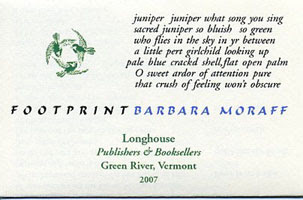
[new Barbara Moraff work from Longhouse, limited edition, 2007; see the Longhouse web site in the right-hand column of this page]
Barbara Moraff, the "baby" of the Beat poets (see her bio on Wikipedia, which she just wrote -- and I put it onto the site), lives here in the Northeast Kingdom and continues to deliberately position her poetry in opposition to the generation preceding hers. I note that many of us feel that same urge: to see the past as overly formal and reserved, and to reach for ways to cut more deeply and vigorously into the ground we're planting.
So in a recent binge of research on earlier Vermont poets, I was delighted to discover that (Mrs.) Alice Mary Kimball, a 1905 graduate of the Johnson (VT) State Normal School, burst out of her teaching career in 1910 to take up "newspaper work" -- moving to New York City in 1914 and in 1929 producing a 128-page volume titled THE DEVIL IS A WOMAN. In contrast, Julia C. R. Dorr, born in 1825 "out of state" but settled again in Middlebury at age 4, turned out to be a far more prolific writer, with 16 books listed in the Bibliography of Vermont Poetry (Coates) -- and almost all of her work dealt with Vermont scenery and "spiritual" thoughts.
My favorite from this exploration turned out to be Maude Wheeler Pierce, whose rather forbidding name almost kept me away from reading the volume of her work that Walter Coates printed at his Driftwind Press: DREAM BURDENS. Yet despite the formal lines and stanzas, the description here could fit directly into the inquisitive Buddhist spirituality and back-to-land motif that mark today's rebels:
THE HILL-WOMAN
"She was a strange wild woman"--
So all her neighbors said --
That she should walk at night abroad
While they were all in bed.
They thought her dress erratic
And all her manners queer
And often caught her listening
For sounds they could not hear.
She smiled while they were weeping
And wept at others' mirth,
She turned her face on wedding joys
And wrung her hands at mirth.
How could they know the magic
Of star-lit skies at night,
The coolness of the rain-washed grass,
Who only walked in light?
They never caught the music
Of the spinning earth and moon
Or held the thrilling rhythm
An ancient deathless rune.
When at dawn they found her lying,
Bruised red poppies in her hand
They shrugged and only counted
"One less dreamer in the land."
2 comments:
Great to see my Great grandmother can still reach out and touch you. I love reading her work, it energizes me. Great to see she is not forgotten.
What a wonderful heritage!
Post a Comment